Down Time
24 October
The year is winding down.
Flights of geese pass overhead to the winter feeding grounds. The trees are a blaze of
colour. Last year, with the dry conditions, the trees almost dropped their leaves as
one. This year, we are getting a proper autumnal feeling. There's the beginnings of
damp chills but no proper freeze yet. We've had one morning of fog but also some
beautiful, bright, crisp mornings.
I'm not worried by the changing seasons this year. I'm more aware of how afraid I was
of the shortening days last year and previous years. Whether it's the light box or
the medication or simply a change in me, I cannot be certain. I'm just facing it with
an entirely different attitude.
|
Tuesday, after work, I got myself over to the Lowry for Opera North's performance of
Puccini's Manon Lescaut, a work that I had never seen before.
I thoroughly enjoyed the night out. The critics had been very unsympathetic to the show
but they had loved last year's Russalka
which I hated. Though I'm not sure that all of the transposition from 18th Century
France to a film studio in 1940s Liberation Paris worked, it didn't do incomparable
damage to the work.
I liked Hugh Smith's Italianate tenor Des Grieux with its touch of squillo - a
term that refers to the slightly trumpeting sound which is expected and is not a
reference to squealing. Natalia Dercho's Manon was more in this line. She had a good
technique but I didn't like the slightly curdled sound of her voice.
Christopher Purves gave another stalwart performance as Lescaut. Brian Bannatyne-Scott
completed the line-up as Geronte. Thirty years ago, he appeared on television in a
series of Master Classes with Elizabeth Schwarzkopf being told to make a face like an
elephant's nose to produce a certain German sound. Now he is performing aging roué
rôles. That time has passed quickly. The biggest plus of the evening was Richard
Farnes's exemplary conducting.
I would certainly go and see the piece and the production again even though it doesn't
pack the punch of a Bohème, a Tosca or a Butterfly - but
then neither do other Puccini works, Turandot included. Three stars for a good
effort. ![[Three Stars - Good]](3.gif)
|
 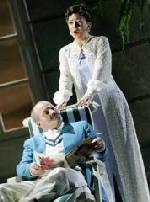  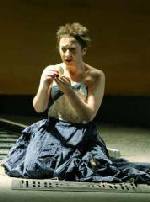
|
It was interesting to compare this work with Massenet's Manon which tells the
same story but in a much more elegant way. I love Manon; it is heart-achingly
beautiful and, in its own way, quite psychologically gripping. The Puccini is much
rawer and more direct - nastier too. Where the Massenet draws you in, seduces you
with its melodies and then tugs the rug from under your feet, the Puccini goes all out
to grip you by the throat and savage you. For me, it was an object lesson in
understanding the differences between the French and Italian schools.
|
Friday, I should have been back to the Lowry again for another Opera North performance;
this time Mozart's Cosi fan tutte.
Until last year, it had been nearly a decade
since I had seen a performance of Le nozze di Figaro. Strangely, it has been the
same with Cosi as well. I saw two performances in the space of a few months in
1995 and, since then, nothing.
The auguries were good too. This was the only production of the season which the
critics were almost unanimous in praising.
|
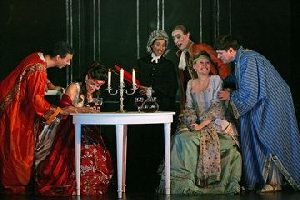 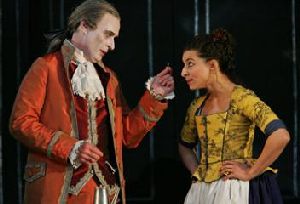
|
But I'm still waiting. Friday turned out to be a beast of a day at work. I had to
contend with a cocked up disciplinary procedure and another student collapsing - this
time low blood pressure rather than grand mal seizure. So, I played safe and
had an early night with my Rossi.
|
We girded our loins for Saturday night, however, and took in Gluck's Orfeo ed
Euridice via a very enjoyable pizza at Pizza Express. This is an opera I've seen a
number of times in the past decade; at ENO in 1997
and 1999 and at WNO in
2000.
I was attracted to this performance because of the collaboration between Opera North
and Emio Greco | PC, a contemporary dance company based in Holland. The work is a fusion
of opera (a story told through melody and song) and dance (a story told through rhythm
and movement) looking for a radical clarity by returning to classical (ie Graeco-Roman)
principles.
In the event, although there were some things to appreciate about the presentation from
an intellectual point of view, the show has to be considered a flawed experiment.
Perhaps, if the dance company had been different... but the guiding force, Emio Greco,
seemed too pleased to place the dance element before the operatic content and, frankly,
his style of dance was a bit limp, self-satisfied and lacking in choreographic ideas.
In the circumstances, the cast did tolerably well and Claire Ormshaw singing Amore
proved herself to be more than capable of both executing the choreography given her
and providing the best singing of the evening.
|
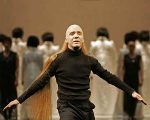 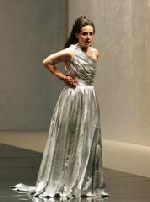 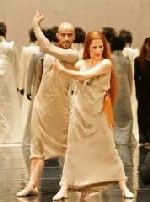 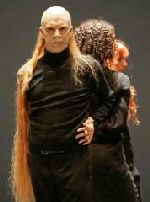
|
Daniel Taylor was less successful as Orfeo and Isabel Monar was passable as Euridice
but how much the production contributed to their lack of attack is difficult to
calculate. Taylor was encumbered by a long blond wig that would have taken the prize
for worst costume of the year had someone not chosen to dress the chorus for their
first entrance in white duvets and jet black Afro wigs.
I can't really offer the occasion more than two stars
![[Two Stars - Average]](2.gif) even if I am
grateful for any opportunity to hear this fabulous piece of music.
even if I am
grateful for any opportunity to hear this fabulous piece of music.
![]()









